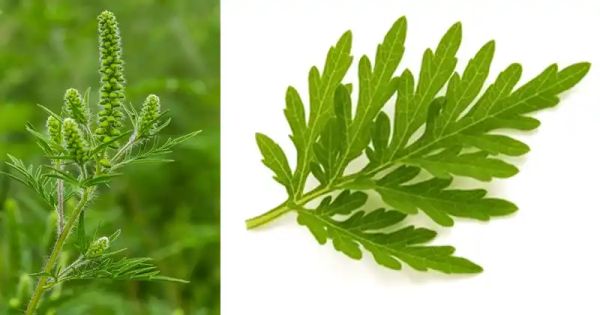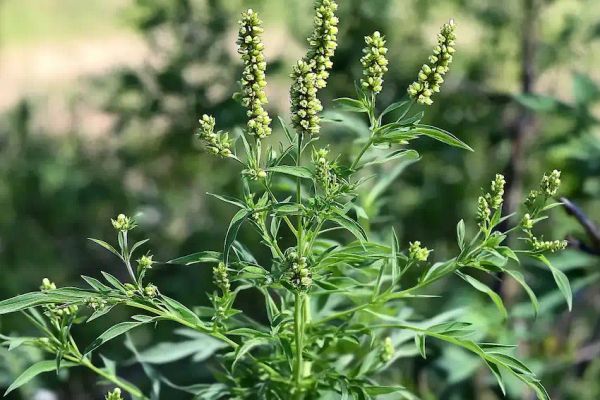As we age, seasonal allergies can become more bothersome. Common ragweed, known for its irritating pollen, is often seen as a nuisance. However, this unassuming plant actually has incredible medicinal properties that have been used for centuries. Let’s discover the remarkable health benefits of common ragweed, how to use it safely, and practical ways to incorporate it into your wellness routine.

10 Health Benefits of Common Ragweed
1. Natural Antihistamine: Common ragweed leaves are rich in antihistamine properties, making them highly effective in alleviating symptoms of seasonal allergies such as itchy eyes, runny nose, and scratchy throat. Using ragweed correctly can help manage reactions to pollen, dust, and pet dander.
2. Relief from Allergic Asthma: Ragweed’s antihistamine effects extend to respiratory issues, offering relief for those suffering from allergic asthma by reducing inflammation and easing breathing difficulties.
3. Anti-inflammatory Properties: Traditionally, common ragweed has been used to reduce inflammation. It can be applied topically to soothe skin irritations, insect bites, and allergic rashes, providing relief from redness and swelling.
4. Antispasmodic Effects: Ragweed’s ability to reduce muscle spasms makes it beneficial for alleviating cramps associated with menstruation, gastrointestinal discomfort, or leg cramps.
5. Digestive Aid: The plant’s mild antispasmodic properties also make it useful for calming an upset stomach and reducing symptoms of indigestion, such as bloating and cramping.
6. Skin Health: Ragweed can be used externally to treat hives and other allergic skin reactions. A tea made from the leaves can be applied as a wash to soothe itchy and inflamed skin.
7. Immune System Support: The anti-inflammatory and antihistamine properties of ragweed may help modulate the immune system, particularly in individuals with overactive immune responses to allergens.
8. Pain Relief: In folk medicine, ragweed has been used to relieve mild pain, especially in conditions related to inflammation and muscle tension.
9. Respiratory Health: Beyond its antihistamine properties, ragweed can help clear sinuses and reduce congestion, making it useful during colds or when dealing with nasal congestion.
10. Potential Anti-Cancer Properties: Emerging research suggests that certain compounds in ragweed may have anti-cancer properties, although more studies are needed. Traditionally, it has been used to support overall wellness and prevent disease.
How to Use Common Ragweed
Here are five practical ways to incorporate common ragweed into your health regimen:
1. Ragweed Tea: Harvest fresh ragweed leaves before the plant starts producing pollen. Rinse them thoroughly. Boil water and add a handful of ragweed leaves. Let it steep for 10-15 minutes, then strain and drink the tea warm. Drink 1-2 cups daily during allergy season to help alleviate symptoms.
2. Tincture: Fill a jar with chopped ragweed leaves and cover them with high-proof alcohol, like 190-proof grain alcohol. Seal the jar and store it in a cool, dark place for two weeks, shaking it daily. After two weeks, strain the liquid into a dropper bottle. Take 15-30 drops in a glass of water up to three times a day to manage allergy symptoms.
3. Topical Wash for Skin Irritations: Brew a strong tea using ragweed leaves. Allow the tea to cool, then soak a clean cloth in the tea. Apply the cloth to affected areas of the skin to soothe hives, rashes, or insect bites.
4. Ragweed Compress: Make a strong decoction by boiling ragweed leaves in water until the liquid reduces by half. Soak a cloth in the warm decoction. Apply the warm compress to sore muscles or cramps to reduce pain and inflammation.
5. Inhalation for Sinus Relief: Boil ragweed leaves in a pot of water. Once the water is steaming, remove it from heat. Place your face over the pot (keeping a safe distance) and cover your head with a towel to trap the steam. Inhale deeply to clear your sinuses and relieve congestion.

Common ragweed, often dismissed as a mere allergen, holds significant medicinal potential. From its powerful antihistamine effects to its soothing properties for cramps and skin irritations, this plant is a valuable addition to any natural health toolkit. However, it’s crucial to use common ragweed with care, ensuring that it’s properly identified and prepared.
Disclaimer: While common ragweed is generally safe when used appropriately, it may cause adverse reactions in individuals who are particularly sensitive to its components. It is not recommended for use in life-threatening allergic reactions or anaphylaxis. Always consult with a healthcare provider before using any new herbal remedies, especially if you have existing health conditions or are pregnant or breastfeeding.
By embracing the benefits of common ragweed, you can harness the power of nature to support your health and well-being. For more insights into the benefits of natural remedies, check out how dandelion leaves can benefit your health or explore the therapeutic uses of goose grass.



